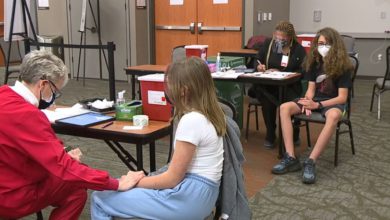
A new vaccine being tested could offer another solution to help opioid users with an addiction.
“All my life, I've been working on drugs of abuse like substance abuse disorder, etcetera,” Marco Pravetoni, an associate professor of pharmacology and medicine at the University of Minnesota Medical School, said.
Pravetoni has been working on a vaccine for opioid use for more than a decade at the University of Minnesota.
“It’s a synthetic vaccine that is composed of the target opioid link to a carrier immunogenic protein,” he said.
The vaccine tells the body to make antibodies for oxycodone.
“These antibodies will be selective for the target opioids,” he said.
“The antibodies will bind to the oxycodone molecule and prevent it from getting into the brain, so it should blunt the effects of the oxycodone,” Sandra Comer, Director of the Opioid Laboratory at Columbia University, said.
This prevents the drug “high” and rewarding properties, Comer said.
Comer is leading the clinical trials. Right now, the vaccine for oxycodone addiction is in Phase 1 clinical trial, as approved by the FDA.
“The Phase 1 study is typically focused on safety,” she said. “That study is intending to enroll anywhere between 12 and 24 subjects and then we’ll have to see what they’ll allow us to do next.”
This vaccine will work with other treatments that are currently in use.
“What we’re hoping is that if we give a combination of the vaccine and methadone for example, if somebody relapses after a few months, at least the vaccine-generated antibodies would still provide some protection against overdose,” Comer said.
Emergency physician Dr. Donald Stader said he can see this new, novel solution being helpful.
“We do not know if this is going to be significant in our patient population, but I think it’s very promising,” he said. “We know opioid addiction, even in the midst of the COVID pandemic we’re currently facing, is still the number one killer of Americans under the age of 50.”
“We do see the ravishes of the opioid crisis every day in terms of patients who have overdosed, in terms of patients who come to us in withdrawal, or patients coming to us seeking help with an opioid use disorder. And I will tell you it has gotten much, much worse over the past two years,” Dr. Stader said.
While a vaccine for oxycodone is in Phase 1 trials -- and still has Phase 2 and Phase 3 to go -- Pravetoni said they are developing them for heroin and other drugs as well.
“I've been working on it for so long, but it's also true that this is the first clinical trial ever for an opioid vaccine. And if this works it will open up the field for other medications so that other folks working on cocaine and meth or whatever other type of vaccine that could still help people, that will create a precedent for other teams working on this,” Pravetoni said.
Comer said it will be a while before the vaccine is commercially available, but they hope to eventually create a multivariate vaccine.
“Our overall goal is to develop a series of vaccines that can actually prevent the negative effects of multiple opioids,” Pravetoni said.








